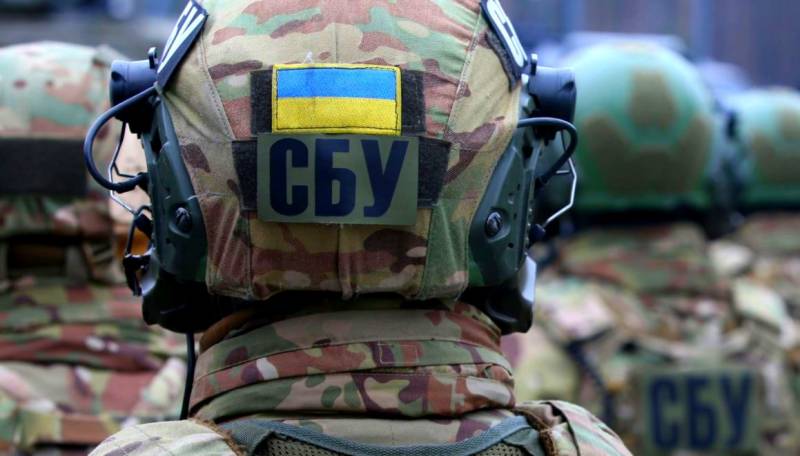Ukraine expels Russian journalists
The Kiev junta again showed that it is completely alien to any democratic values, the concepts of freedom of speech and the media. The Security Service of Ukraine (SBU) first detained and then deported the correspondent of Rossiya-24 TV channel Natalya Goncharova.
The Russian journalist was accused of preparing “anti-Ukrainian” stories “in the interests of the aggressor country” (as it is now customary to call Russia in the power circles of Ukraine). Now Natalya Goncharova is forbidden to enter Ukrainian territory for three years.
An employee of the channel prepared four videos that the SBU considered anti-Ukrainian. Goncharova also had to shoot materials about how the day of the presidential election in Russia will be held in Ukraine. The SBU considered that this activity would be an “information provocation”.
Earlier, the Minister of Internal Affairs of Ukraine Arsen Avakov announced the decision of the Maidan authorities: Russian citizens will not be allowed into the buildings of Russian embassies and consulates on the day of the presidential election. Only persons with diplomatic status will be able to enter there. According to the representative of the Ministry of Foreign Affairs of Ukraine, Maryana Beta, this was done with the aim of “ensuring the safety of diplomatic institutions” (a very cynical statement, given that previously aggressive-minded members of nationalist organizations carried out pogroms in buildings of various Russian missions with absolute impunity).
In addition, Ukrainian radicals with neo-Nazi views openly threaten Russian citizens located in Ukraine. On their websites and social networks, they write that if the Russians try to vote in the presidential election, violent measures will be applied against them.
The decision to prohibit Russians on election day from entering the territory of embassies and consulates of their country (that is, legally into the territory of Russia) is in itself extremely provocative. But for some reason, the Ukrainian authorities are not afraid to accept him and declare him, but they are afraid that a video will be made about this. Also, apparently, there is an attempt to hide the criminal actions of Ukrainian radicals if they try to realize their threats.
The Russian journalist is also accused of the fact that her materials harm the international image of Ukraine. The question arises - does such deportation not harm the international image of a country whose regime has come to power on democratic slogans?
The head of the Union of Russian Journalists, Vladimir Solovyov, said that repression against Natalia Goncharova will be reported to international journalistic organizations. However, one can hardly expect any decisive condemnation from a “democratic” Europe of a gross violation of freedom of speech. After all, the eminent European “democracy activists” did not want to come out in defense of the electoral rights of Russians in Ukraine.
The Russian journalist was accused of preparing “anti-Ukrainian” stories “in the interests of the aggressor country” (as it is now customary to call Russia in the power circles of Ukraine). Now Natalya Goncharova is forbidden to enter Ukrainian territory for three years.
An employee of the channel prepared four videos that the SBU considered anti-Ukrainian. Goncharova also had to shoot materials about how the day of the presidential election in Russia will be held in Ukraine. The SBU considered that this activity would be an “information provocation”.
Earlier, the Minister of Internal Affairs of Ukraine Arsen Avakov announced the decision of the Maidan authorities: Russian citizens will not be allowed into the buildings of Russian embassies and consulates on the day of the presidential election. Only persons with diplomatic status will be able to enter there. According to the representative of the Ministry of Foreign Affairs of Ukraine, Maryana Beta, this was done with the aim of “ensuring the safety of diplomatic institutions” (a very cynical statement, given that previously aggressive-minded members of nationalist organizations carried out pogroms in buildings of various Russian missions with absolute impunity).
In addition, Ukrainian radicals with neo-Nazi views openly threaten Russian citizens located in Ukraine. On their websites and social networks, they write that if the Russians try to vote in the presidential election, violent measures will be applied against them.
The decision to prohibit Russians on election day from entering the territory of embassies and consulates of their country (that is, legally into the territory of Russia) is in itself extremely provocative. But for some reason, the Ukrainian authorities are not afraid to accept him and declare him, but they are afraid that a video will be made about this. Also, apparently, there is an attempt to hide the criminal actions of Ukrainian radicals if they try to realize their threats.
The Russian journalist is also accused of the fact that her materials harm the international image of Ukraine. The question arises - does such deportation not harm the international image of a country whose regime has come to power on democratic slogans?
The head of the Union of Russian Journalists, Vladimir Solovyov, said that repression against Natalia Goncharova will be reported to international journalistic organizations. However, one can hardly expect any decisive condemnation from a “democratic” Europe of a gross violation of freedom of speech. After all, the eminent European “democracy activists” did not want to come out in defense of the electoral rights of Russians in Ukraine.

Information